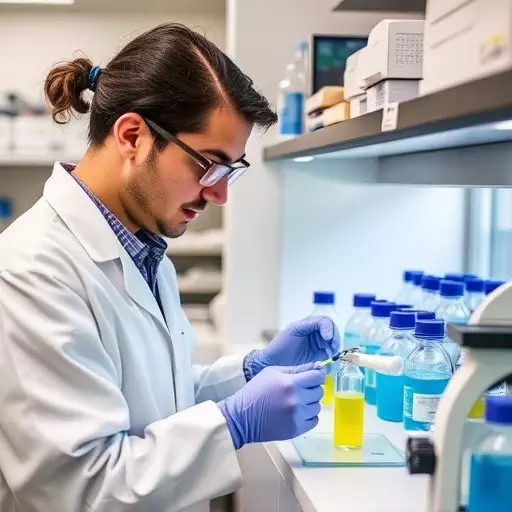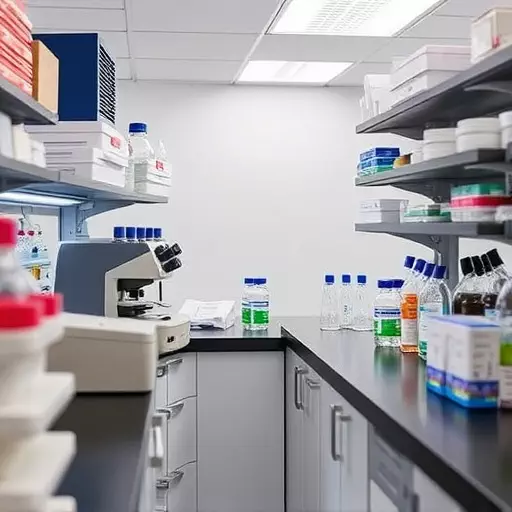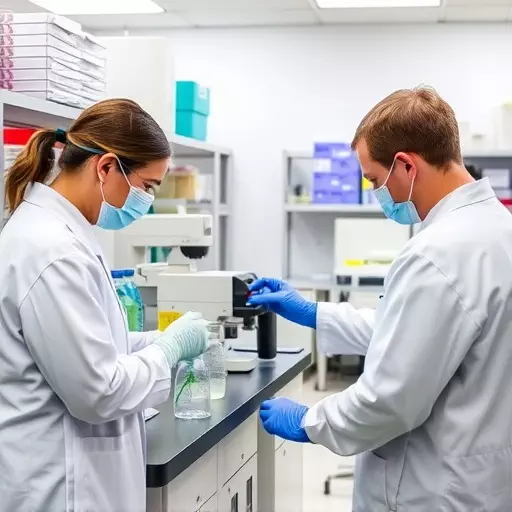Clinical trials in Bloomington-Bedford leverage cutting-edge DNA sequencing and lab automation technologies to advance medical research. These advanced techniques enable efficient processing of vast data sets, personalized treatment approaches, and faster results. Volunteers contribute to scientific knowledge while individuals seeking lab work find opportunities in a thriving hub for DNA sequencing and automation. The region's strong focus on innovation, combined with a diverse pool of volunteers and specialized facilities, makes Bloomington-Bedford an exciting destination for clinical research, offering rewarding prospects for both participants and researchers.
Clinical trials are pivotal gateways to medical advancements, playing a crucial role in developing and testing new treatments. This article delves into various facets of modern clinical research, including the understanding of clinical trials, the integration of DNA sequencing, lab automation’s streamlining effects on trial management, and ethical considerations for participant safety and engagement. Additionally, it explores Bloomington-Bedford’s vibrant clinical trial landscape and offers insights into navigating recruitment processes for prospective lab work.
- Understanding Clinical Trials: A Gateway to Medical Advancements
- The Role of DNA Sequencing in Modern Clinical Research
- Lab Automation: Streamlining Processes for Efficient Trial Management
- Bloomington-Bedford's Clinical Trial Landscape: Opportunities for Participants and Researchers
- Navigating the Recruitment Process: How to Find and Apply for Lab Work in Your Area
- Ethical Considerations: Ensuring Safe and Participatory Clinical Trials
Understanding Clinical Trials: A Gateway to Medical Advancements

Clinical trials are pivotal studies that unlock the gateway to medical advancements and improved patient care. These research endeavors involve meticulous testing and evaluation of new medical treatments, including medications, devices, or surgical procedures, in a controlled environment. By participating in clinical trials, volunteers contribute to scientific knowledge and play a vital role in shaping future healthcare practices. Understanding these trials is essential for anyone interested in the intersection of science and medicine.
In today’s era of rapid technological progress, labs in Bloomington-Bedford offer cutting-edge facilities for research, particularly focusing on lab work involving DNA sequencing and automation. These advancements enable researchers to process vast amounts of data, expedite results, and improve overall efficiency. For instance, lab automation can streamline repetitive tasks, allowing scientists to concentrate on analysis and interpretation, while DNA sequencing provides valuable insights into genetic components, crucial for personalizing treatments in clinical settings.
The Role of DNA Sequencing in Modern Clinical Research

In the realm of modern clinical research, DNA sequencing has emerged as a powerful tool, revolutionizing the way we approach and conduct trials. With advancements in lab automation and sophisticated sequencing technologies, researchers now have unprecedented capabilities to unravel complex genetic information. This transformative capability is particularly evident when individuals are seeking specialized lab work in Bloomington-Bedford or beyond, as DNA sequencing plays a pivotal role in personalizing treatments and improving patient outcomes.
By analyzing an individual’s DNA, researchers can identify specific genetic variations and mutations that may impact their response to various medications or treatments. This knowledge enables more precise and tailored clinical trials, ensuring that each participant receives the most effective and safe care possible. Moreover, DNA sequencing helps in identifying rare diseases and understanding their genetic basis, which was previously challenging without advanced genomic tools.
Lab Automation: Streamlining Processes for Efficient Trial Management
In the realm of clinical trials, efficient management is paramount to ensure success and speed up patient treatment. Lab Automation plays a pivotal role in achieving this by streamlining processes that were once laborious and time-consuming. By integrating advanced technologies such as automated liquid handling systems and robotic platforms, labs in Bloomington-Bedford can optimize their operations, from DNA extraction and PCR setup to high-throughput DNA sequencing. These innovations not only reduce manual errors but also significantly enhance productivity, allowing researchers to focus more on data analysis and interpretation.
Through lab automation, clinical trial management becomes more agile and responsive to dynamic research needs. This is particularly beneficial for complex projects involving large-scale genomic analyses, where precise and consistent sample handling is crucial. Moreover, automation enables the consolidation of resources, making it easier to coordinate and collaborate within interdisciplinary teams. For those seeking to contribute to groundbreaking research in Bloomington-Bedford, finding lab work that leverages DNA sequencing and lab automation can open doors to exciting possibilities and accelerate progress in clinical trials.
Bloomington-Bedford's Clinical Trial Landscape: Opportunities for Participants and Researchers

Bloomington-Bedford boasts a thriving clinical trial landscape, offering ample opportunities for both participants and researchers. With a strong focus on medical advancements, this region has become a hub for innovative studies, particularly in areas like DNA sequencing and lab automation. Finding lab work in Bloomington-Bedford is easier than ever, with numerous research institutions and universities actively recruiting volunteers.
Researchers here benefit from cutting-edge facilities and a diverse pool of potential participants, ensuring the successful execution of clinical trials. The availability of advanced technologies, such as DNA sequencing equipment and automated lab systems, further strengthens the region’s position in driving medical breakthroughs. This dynamic environment presents an exciting prospect for both individuals seeking meaningful contributions to healthcare and scientific investigators aiming to push the boundaries of medical research.
Navigating the Recruitment Process: How to Find and Apply for Lab Work in Your Area

Navigating the recruitment process for clinical trials can be a rewarding way to contribute to medical research. For those looking for lab work in Bloomington-Bedford, there are several steps to take. Start by researching local labs specializing in DNA sequencing and lab automation, as these skills are highly sought after in clinical trial settings. Online job boards, university career centers, and professional networking sites like LinkedIn can be excellent resources for finding openings.
When applying, highlight your relevant experience with DNA sequencing and any familiarity with lab automation technologies. Demonstrating a passion for medical research and a commitment to accurate data collection will set you apart. Don’t forget to inquire about opportunities for training or mentorship within the lab, as these can enhance your skills and make you a valuable asset to clinical trial teams in Bloomington-Bedford.
Ethical Considerations: Ensuring Safe and Participatory Clinical Trials

Clinical trials, while crucial for medical advancements, must adhere to strict ethical guidelines to ensure participant safety and well-being. This includes informed consent, where potential subjects fully understand their involvement, risks, and benefits. In the context of modern clinical research, integrating lab technologies such as DNA sequencing and automation can enhance efficiency but also necessitate additional oversight. These advanced methods require robust data management practices to safeguard participant privacy and maintain the integrity of findings.
In Bloomington-Bedford, where medical research is thriving, labs engaging in clinical trials must balance innovation with ethical responsibility. For instance, lab work involving DNA sequencing demands careful handling of genetic data, adherence to strict protocols, and compliance with regulations like GDPR (General Data Protection Regulation) or HIPAA (Health Insurance Portability and Accountability Act). Finding the right equilibrium between utilizing cutting-edge lab automation for faster, more accurate results and upholding ethical standards is key to conducting safe and participatory clinical trials.
